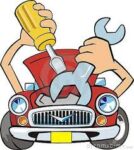Here are 7 of the most likely potential causes of a noisy old car:
- Worn-out engine: As an engine gets older, it can become louder as the parts wear down and become less efficient. This can be caused by a variety of issues, such as wear on the bearings or pistons, or a malfunctioning timing chain. A worn-out engine may produce a knocking or ticking noise.
- Exhaust system issues: If there is a problem with the exhaust system, it can cause noise. This could be caused by a damaged muffler, a loose exhaust pipe, or a malfunctioning catalytic converter. An exhaust system issue may produce a loud, rumbling noise or a hissing noise.
- Worn-out suspension components: The suspension system is responsible for keeping the car stable and smooth-riding. If the suspension components are worn out or damaged, it can cause noise and a rough ride. Worn-out suspension components may produce a thumping or knocking noise as the car moves over bumps or uneven surfaces.
- Loose or damaged body panels: If any of the body panels on the car are loose or damaged, it can cause noise as the car moves. This may include the hood, doors, or trunk lid. Loose or damaged body panels may produce a rattling or vibrating noise as the car moves.
- Loose or damaged drivetrain components: If any of the components in the drivetrain are loose or damaged, it can cause noise. This may include the transmission, the driveshaft, or the differential. Loose or damaged drivetrain components may produce a grinding or whining noise as the car is driven.
- Worn-out brakes: If the brake pads are worn down, it can cause noise as the metal backing plate rubs against the brake rotors. It can also cause noise if the brake rotors are warped or damaged. Worn-out brakes may produce a squealing or grinding noise when the brakes are applied.
- Loose or damaged steering components: If any of the components in the steering system are loose or damaged, it can cause noise as the car is driven. This may include the steering rack, the tie rods, or the ball joints. Loose or damaged steering components may produce a knocking or clunking noise as the car is driven.
It is important to note that these are just general descriptions of the types of noises that each potential cause might produce. The specific noise that a car makes can vary depending on the specific issue and the make and model of the car. If you are unsure of the cause of a noise in your car, it is best to have it inspected by a professional. Click here to talk to a mechanic.
